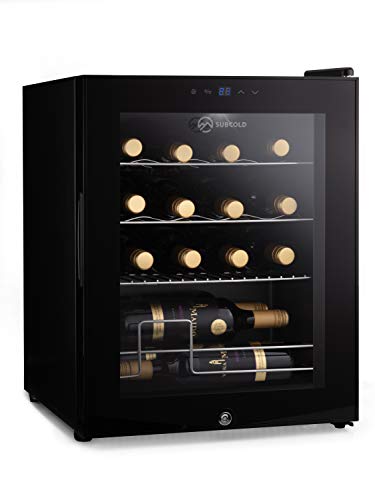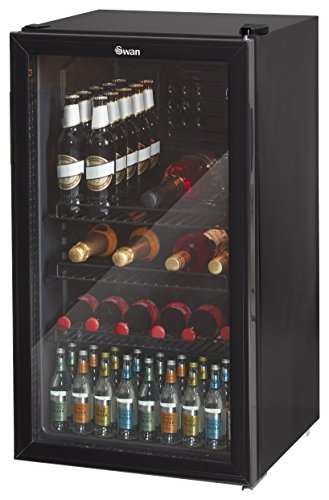Why We Love Beer And Wine Refrigerator (And You Should Also!)
페이지 정보

본문
 Choosing a Beverage and Wine Refrigerator
Choosing a Beverage and Wine RefrigeratorThis dual-zone refrigerator is perfect for cooling and storing both wine and beer. It can be freestanding or built-in, and has a seamless seamless door that is able to fit into any space.
Although vibrations are generally innocuous however, they can cause disturbance to the sediment inside a bottle, and trigger chemical reactions that may not be visible. This can reduce the flavor and reduce esters over time.
Control of Humidity
Humidity is the quantity of water vapor present in the air, and it changes throughout the day based on a variety of factors. Temperature or precipitation, wind, and other environmental conditions can dramatically affect humidity levels. Achieving the right level of humidity is important for a number of reasons. The humidity affects weather patterns as well as indoor air quality and wine storage. The delicate composition of a wine is made up of many aromatic compounds that are sensitive to changes in humidity. The taste of a wine can be affected by excessive humidity. It can alter the balance of these aromatic compounds. A wine fridge can help keep humidity levels at the optimal level to preserve the flavor of a bottle.
A wine fridge can also help prevent the deterioration of corks as well as ensure an adequate seal. Corks can dry out when the humidity is too low. This allows oxygen to enter the bottle and accelerates the aging process. A wine fridge can help keep the humidity between 55% and 75 percent to stop this from happening.
While a wine cellar is designed to last a long time wine coolers also provide excellent storing conditions for wines and beer. They usually have designated spaces for beer bottles so you can keep your favorite craft beers and lagers right alongside your favorite wines. These units are designed to balance temperature and humidity in order to prevent condensation, which can damage labels and packaging.
Most models come with an hygrometer that allows you to monitor the humidity level in your wine cooler and adjust it accordingly. You can also use a humidifier to boost the humidity inside your wine fridge.
If you decide to use a dehumidifier, ensure that it's set up in a separate room from the wine fridge. This will stop the dehumidifier from absorbing any beer or wine you keep in the refrigerator. If you intend to store your wine for a prolonged period of time, controlling the humidity is essential. You may not notice any change in the taste of your wine for a short period of time, however, a lack of humidity could be a major influence on the taste of your favorite wines over months and years.
Vibration Absorption
Vibrations in the wine refrigerator could alter the natural aging process for the wines stored in it. Even small vibrations can cause sediment to move inside the bottle, triggering complicated chemical reactions that can decrease esters and dull the wine's flavor in time. All La Sommeliere units have a vibration absorption system that minimizes noise and tremors, allowing your wine to age peacefully and efficiently.
Aside from the fact that wine coolers typically emit less sound than standard refrigerators, they are still predisposed to noise issues due to the system of refrigerant circuits and fan systems that are found in the majority of units. It is for this reason that it is important to follow all clearance guidelines when installing your wine cooler and to place the unit in a quiet location far from any other sources of noise.
It is also recommended to clean your wine cooler periodically using a nonabrasive cleaning product and let it "air out" for a few minutes before loading it up with bottles. This will reduce the amount of dirt and dust that could accumulate in the air vents.
If you notice that your wine fridge is making loud noises, it could be due to a problem with the compressor or electric fan. The compressor is usually located behind the wine fridge. If it is positioned unevenly or is struck by something behind it, it can shake itself free from its rubber mounts, which can produce loud humming sounds.
The compressor wine cooler functions like a standard fridge by compressing air molecules electronically, which decreases their temperature. They then blow throughout the interior of your fridge. This type of cooling is more energy efficient than other cooling methods, like evaporator or frost-free refrigerators. Compressor wine coolers are noisy and require more frequent maintenance. For this reason, many consumers opt to buy thermoelectric wine coolers which don't make use of a compressor system.
Temperature Control
Like tall wine fridge, beer has distinct temperature requirements that help it maintain optimal flavor. This is why it's important to choose a beverage and wine fridge that offers adjustable temperature controls so you can store your drinks at the ideal temperature for serving and storage for each style. Dual-zone models are available, which have separate temperature zones for beer and wine bottles.
In general, most beer types are served cooler than wines. However, the optimal serving temperature for a particular style depends on its kind and the method of production. Wheat beers and pilsners should be served between 40 and 50 degrees Fahrenheit. IPAs, barleywines and stronger ales are Best Home Wine Refrigerator served at 50 to 55 degrees Fahrenheit. If you let a beer warm too much it will create a sour "skunky" smell that will make drinking unpleasant.
You'll need a wine fridge that can provide a temperature range suitable to your favorite reds and whites. Some wine refrigerators come with humidification features that prevent oxidation and keep the cork in good condition. Some are even equipped with UV glass to block out sunlight, which helps to preserve the wine's color and protect it from premature ageing.
The temperature control system of a refrigerator is powered by thermoelectric cooling or compressor technology. Compressor-powered models use the compression of vapors to reduce temperatures inside the wine refrigerator, while thermoelectric models rely on electronic convection fans that circulate cool air through the refrigerator. Most refrigerators employ a combination of these technologies for the most effective results.
If you're planning to buy a beverage and wine fridge that uses compressor technology, you should look for one with shock pads that are vibration-resistant. This is because the vibration generated by compressor-based operations could disrupt the normal process of maturing wine and accelerate the process of oxidation.
While you can buy a fridge that's designed specifically for wine, you may find it more cost-effective to purchase a standard refrigerator, or even a standard refrigerator that has a spacious interior with adjustable shelves and plenty of storage in the door. You can then customize the space to accommodate a wide variety of wine, beer and other bottles and cans.
Storage Options
If you love to host parties and have a wide range of drinks to serve you should consider a cooler for your drinks. These refrigerators can hold bottles and cans of wine, beer and other beverages that are ice cold, such as soda and water. They are available in both built-in and freestanding models. Built-in models can be fitted into cabinets or under counters in kitchens with limited space.
Refrigerators of both types come in different sizes and styles, making them ideal for homes with a variety of. Find models with sliding shelves to make it easier to find your preferred beverages and wines. Some refrigerators feature soft LED lighting that showcases your collection with soft, gentle light. Some even offer the option of controlling humidity. This feature can stop frost from forming in the wine and beer bottles so you can enjoy them without worry.
Dual-zone refrigerators can store your favorite wines at the optimal temperature to serve. You can also store craft beers in the two separate zones since it's at similar temperatures to the wine bottle. A dual zone wine-beer refrigerator can accommodate larger bottles of spirits or beer than a typical refrigerator.
Keep your beer and wine in an area that offers lighting protection. The right conditions will extend their lifespan. The refrigerator should be kept free of odors, dust and other debris that could affect the taste of your drinks over time.
Consider a cellar fridge for storage if you wish to keep your entire collection and preserve its worth. This type of fridge is designed for long-term storage and is able to operate at a slightly higher temperature than a wine refrigerator which allows your wine to develop their best home wine fridge taste. A cellar refrigerator also has an humidifier that keeps the right humidity level. This ensures that the cork stays dry and impermeable. It also prevents external air and notes of food from your refrigerator from getting into the bottle and deteriorating it over time.

- 이전글9 Things Your Parents Taught You About Transport Wheelchairs Lightweight Folding 24.10.13
- 다음글골드 비아그라-정품비아그라-【pom555.kr】-가짜 비아그라 부작용 24.10.13
댓글목록
등록된 댓글이 없습니다.
